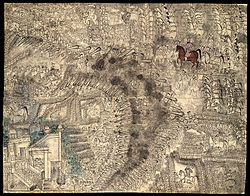
Back Najib Khan Catalan Najib ad-Dawlah Czech Najib al-Dawla Italian ナジーブ・ハーン Japanese നജീബ് ഉദ് ദൗള Malayalam नजीब उद दौला Marathi Наджиб ад-Даула Russian نجيب الدولہ Urdu
Najib-ud-Daula | |
|---|---|
| Nawab Mir Bakhshi Mukhtar Khas "Excellence of the State" "Noble one of the State" | |
 | |
| Commander-in-Chief of The Mughal Empire | |
| Office holding | 1756 – 1759 |
| Successor | Mirza Najaf Khan |
| Padishah | Alamgir II |
| Years active | 1740 – 1770 (30 years) |
| Born | Early-18th Century 1707-08 Maneri, Kabul Subah (present-day Swabi District, Khyber Pakhtunkhwa) |
| Died | 30 October 1770 |
| Children | Zabita Khan |
| Military career | |
| Allegiance | (Mir Bakhshi of Alamgir II) (in service of Shah Alam II) |
| Service/ | |
| Rank | Ispahsalar, Plenipotentiary |
| Battles/wars | Mughal-Maratha Wars Third Battle of Panipat Capture of Agra Fort |

Najib ad-Dawlah (Pashto: نجيب الدوله), also known as Najib Khan Yousafzai (Pashto: نجيب خان), was a Rohilla Yousafzai Afghan who earlier served as a Mughal serviceman but later deserted the cause of the Mughals and joined Ahmad Shah Abdali in 1757 in his attack on Delhi. He was also a House Chief of Rohilkhand, and in the 1740s founded the city of Najibabad in Bijnor district, India. He was instrumental in winning the Third Battle of Panipat.
He began his career in 1743 as an immigrant from Maneri, Swabi (of the Umarkhel subbranch of Mandanr Yousafzais) as a soldier. He was an employee of Imad-ul-Mulk but got alerte from going influence of Marhattas and by advise of Shah Waliullah, he invited Ahmad Shah Abdali in 1757 to attack on Delhi and secure the Muslims place in India. He was then appointed as Mir Bakhshi of the Mughal emperor by Abdali. Later in his career he was known as Najib ad-Dawlah, Amir al-Umra, Shuja ad-Dawlah.[1] From 1757 to 1770, he was governor of Saharanpur, ruling over Dehradun. Many architectural relics of the period of Rohilla, the remains in Najibabad, were overseen by him, which he founded at the height of his career as a Mughal minister.[2]
- ^ History of Etawah Etawah Official website.
- ^ Chisholm, Hugh, ed. (1911). . Encyclopædia Britannica. Vol. 19 (11th ed.). Cambridge University Press. p. 156..